Unit 9 Communication 2023-2024学年冀教版英语九年级全一册单元知识清单(学案)(含解析)
文档属性
| 名称 | Unit 9 Communication 2023-2024学年冀教版英语九年级全一册单元知识清单(学案)(含解析) |
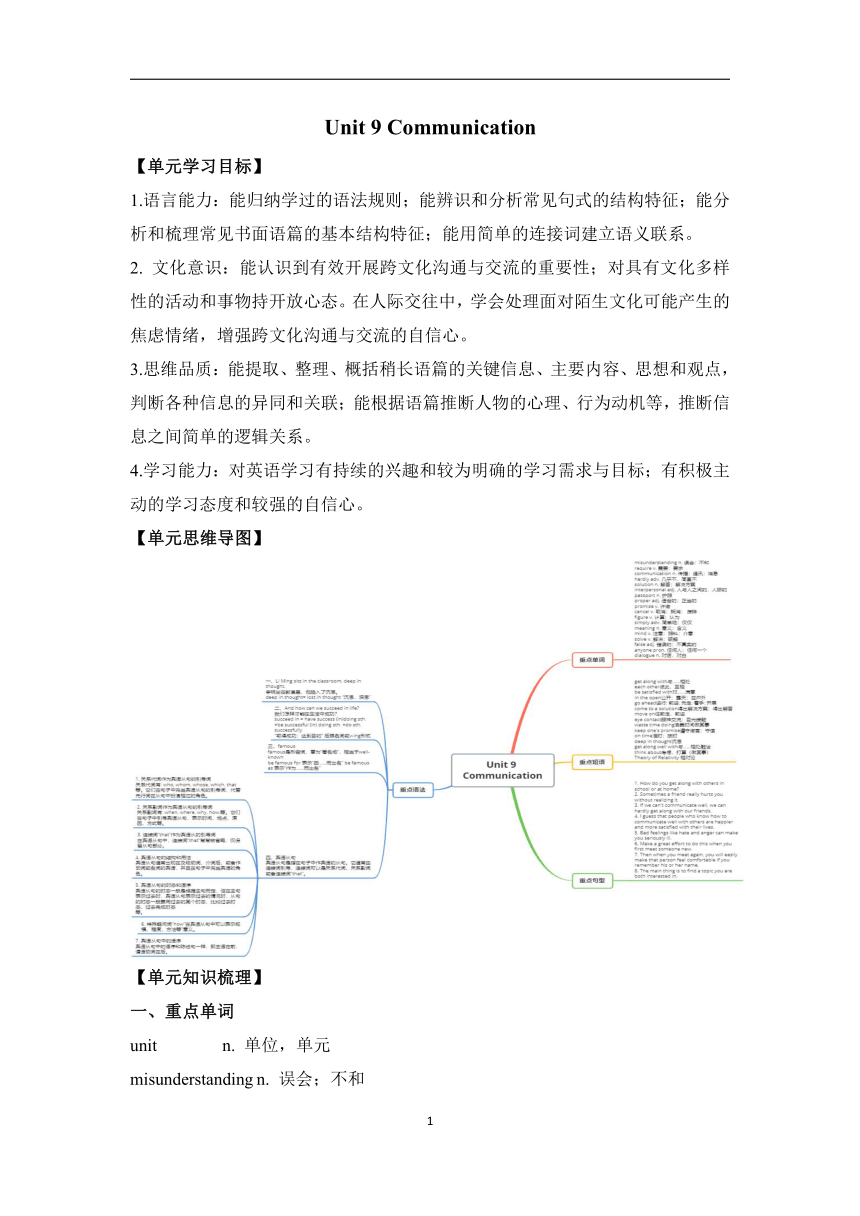
|
|
| 格式 | docx | ||
| 文件大小 | 130.7KB | ||
| 资源类型 | 教案 | ||
| 版本资源 | 冀教版 | ||
| 科目 | 英语 | ||
| 更新时间 | 2023-11-10 13:38:39 | ||
图片预览

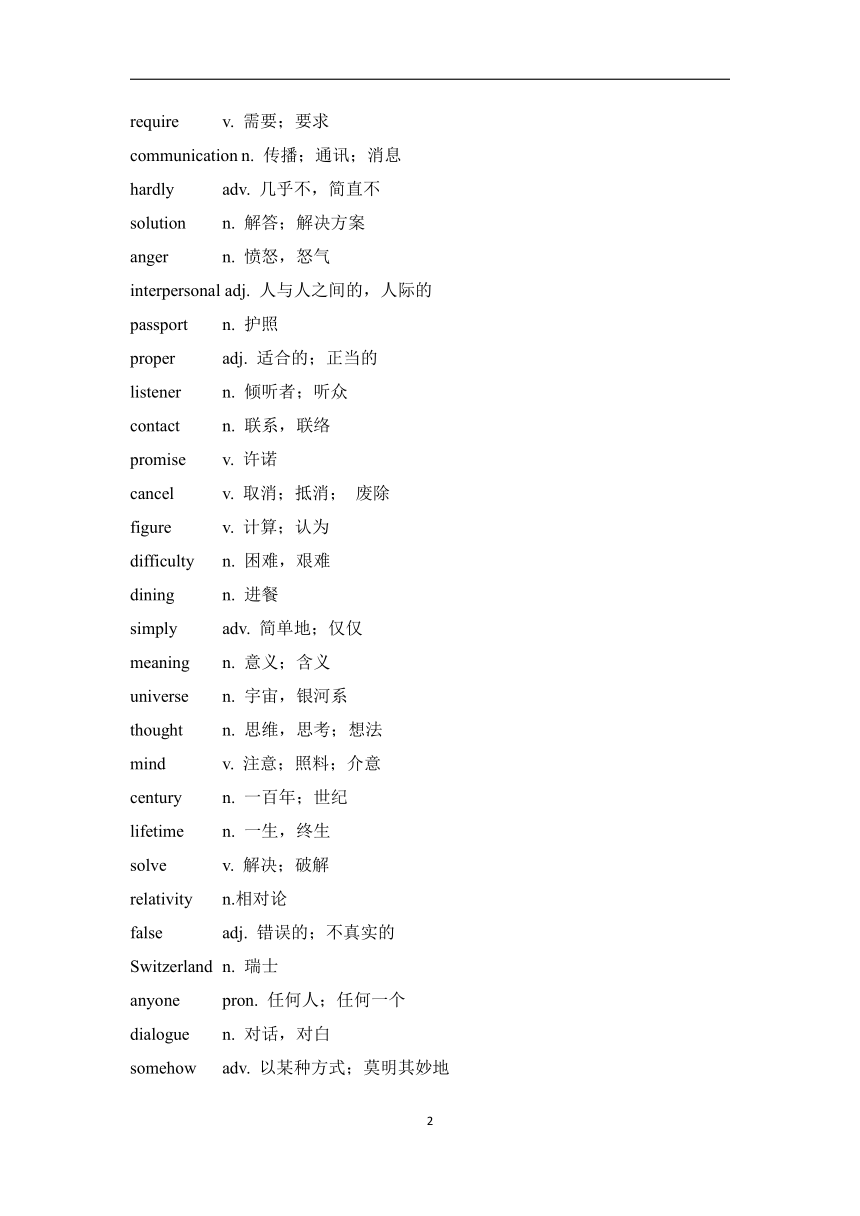
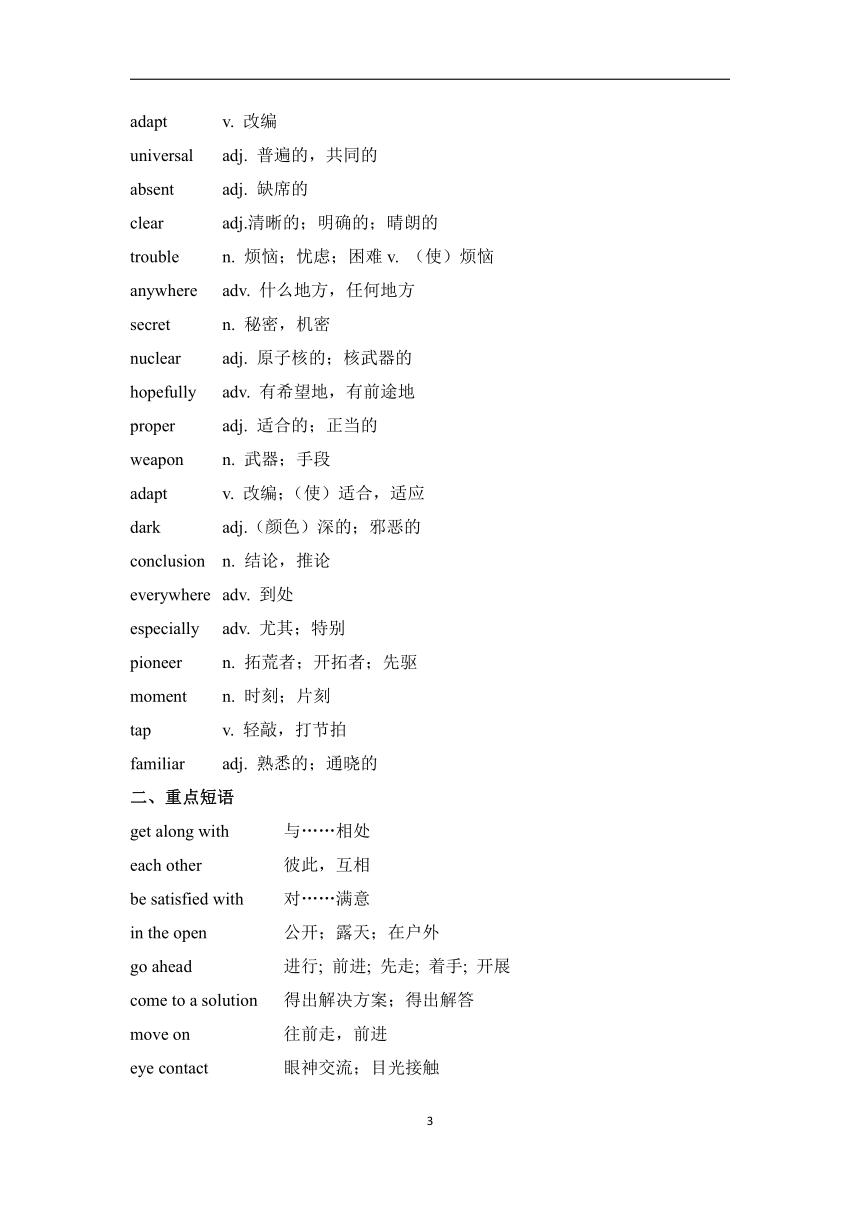
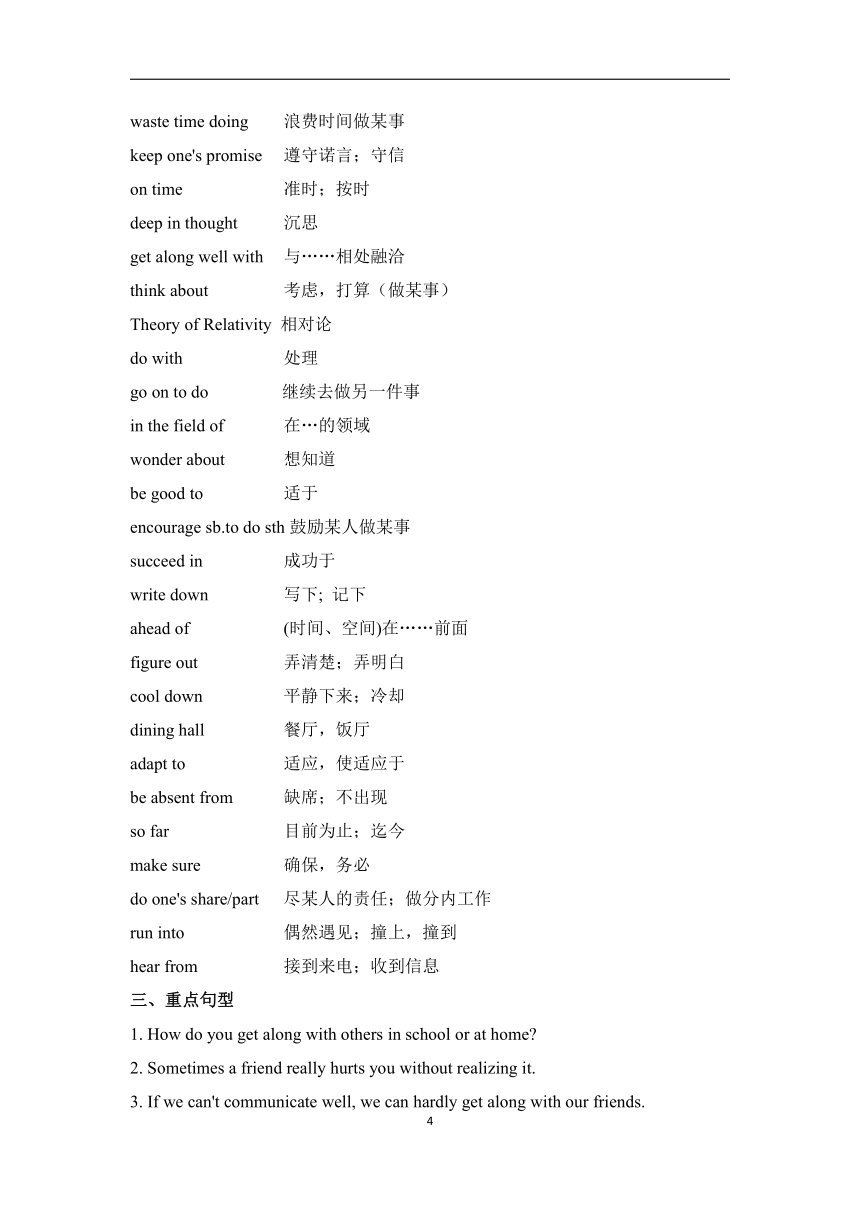
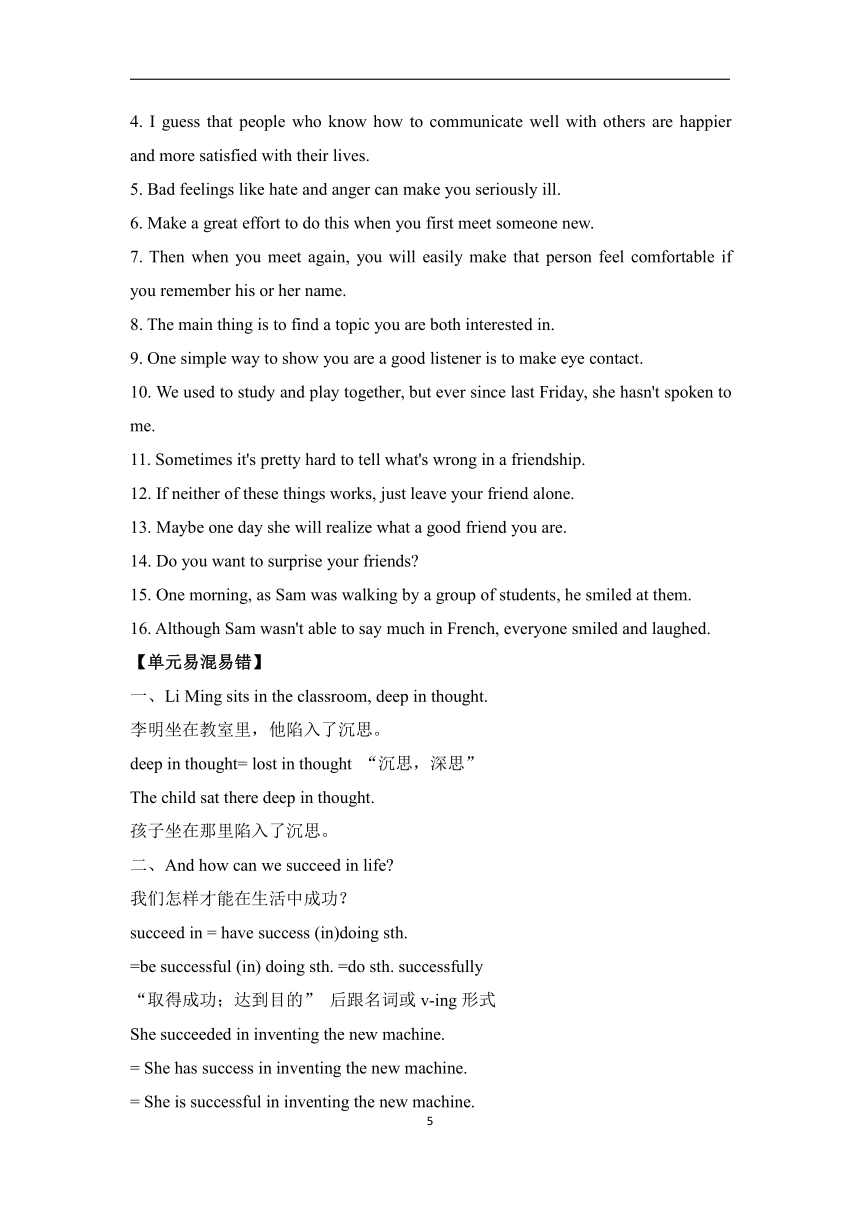
文档简介
Unit 9 Communication
【单元学习目标】
1.语言能力:能归纳学过的语法规则;能辨识和分析常见句式的结构特征;能分析和梳理常见书面语篇的基本结构特征;能用简单的连接词建立语义联系。
2. 文化意识:能认识到有效开展跨文化沟通与交流的重要性;对具有文化多样性的活动和事物持开放心态。在人际交往中,学会处理面对陌生文化可能产生的焦虑情绪,增强跨文化沟通与交流的自信心。
3.思维品质:能提取、整理、概括稍长语篇的关键信息、主要内容、思想和观点,判断各种信息的异同和关联;能根据语篇推断人物的心理、行为动机等,推断信息之间简单的逻辑关系。
4.学习能力:对英语学习有持续的兴趣和较为明确的学习需求与目标;有积极主动的学习态度和较强的自信心。
【单元思维导图】
【单元知识梳理】
一、重点单词
unit n. 单位,单元
misunderstanding n. 误会;不和
require v. 需要;要求
communication n. 传播;通讯;消息
hardly adv. 几乎不,简直不
solution n. 解答;解决方案
anger n. 愤怒,怒气
interpersonal adj. 人与人之间的,人际的
passport n. 护照
proper adj. 适合的;正当的
listener n. 倾听者;听众
contact n. 联系,联络
promise v. 许诺
cancel v. 取消;抵消; 废除
figure v. 计算;认为
difficulty n. 困难,艰难
dining n. 进餐
simply adv. 简单地;仅仅
meaning n. 意义;含义
universe n. 宇宙,银河系
thought n. 思维,思考;想法
mind v. 注意;照料;介意
century n. 一百年;世纪
lifetime n. 一生,终生
solve v. 解决;破解
relativity n.相对论
false adj. 错误的;不真实的
Switzerland n. 瑞士
anyone pron. 任何人;任何一个
dialogue n. 对话,对白
somehow adv. 以某种方式;莫明其妙地
adapt v. 改编
universal adj. 普遍的,共同的
absent adj. 缺席的
clear adj.清晰的;明确的;晴朗的
trouble n. 烦恼;忧虑;困难v. (使)烦恼
anywhere adv. 什么地方,任何地方
secret n. 秘密,机密
nuclear adj. 原子核的;核武器的
hopefully adv. 有希望地,有前途地
proper adj. 适合的;正当的
weapon n. 武器;手段
adapt v. 改编;(使)适合,适应
dark adj.(颜色)深的;邪恶的
conclusion n. 结论,推论
everywhere adv. 到处
especially adv. 尤其;特别
pioneer n. 拓荒者;开拓者;先驱
moment n. 时刻;片刻
tap v. 轻敲,打节拍
familiar adj. 熟悉的;通晓的
二、重点短语
get along with 与……相处
each other 彼此,互相
be satisfied with 对……满意
in the open 公开;露天;在户外
go ahead 进行; 前进; 先走; 着手; 开展
come to a solution 得出解决方案;得出解答
move on 往前走,前进
eye contact 眼神交流;目光接触
waste time doing 浪费时间做某事
keep one's promise 遵守诺言;守信
on time 准时;按时
deep in thought 沉思
get along well with 与……相处融洽
think about 考虑,打算(做某事)
Theory of Relativity 相对论
do with 处理
go on to do 继续去做另一件事
in the field of 在…的领域
wonder about 想知道
be good to 适于
encourage sb.to do sth鼓励某人做某事
succeed in 成功于
write down 写下; 记下
ahead of (时间、空间)在……前面
figure out 弄清楚;弄明白
cool down 平静下来;冷却
dining hall 餐厅,饭厅
adapt to 适应,使适应于
be absent from 缺席;不出现
so far 目前为止;迄今
make sure 确保,务必
do one's share/part 尽某人的责任;做分内工作
run into 偶然遇见;撞上,撞到
hear from 接到来电;收到信息
三、重点句型
1. How do you get along with others in school or at home
2. Sometimes a friend really hurts you without realizing it.
3. If we can't communicate well, we can hardly get along with our friends.
4. I guess that people who know how to communicate well with others are happier and more satisfied with their lives.
5. Bad feelings like hate and anger can make you seriously ill.
6. Make a great effort to do this when you first meet someone new.
7. Then when you meet again, you will easily make that person feel comfortable if you remember his or her name.
8. The main thing is to find a topic you are both interested in.
9. One simple way to show you are a good listener is to make eye contact.
10. We used to study and play together, but ever since last Friday, she hasn't spoken to me.
11. Sometimes it's pretty hard to tell what's wrong in a friendship.
12. If neither of these things works, just leave your friend alone.
13. Maybe one day she will realize what a good friend you are.
14. Do you want to surprise your friends
15. One morning, as Sam was walking by a group of students, he smiled at them.
16. Although Sam wasn't able to say much in French, everyone smiled and laughed.
【单元易混易错】
一、Li Ming sits in the classroom, deep in thought.
李明坐在教室里,他陷入了沉思。
deep in thought= lost in thought “沉思,深思”
The child sat there deep in thought.
孩子坐在那里陷入了沉思。
二、And how can we succeed in life
我们怎样才能在生活中成功?
succeed in = have success (in)doing sth.
=be successful (in) doing sth. =do sth. successfully
“取得成功;达到目的” 后跟名词或v-ing形式
She succeeded in inventing the new machine.
= She has success in inventing the new machine.
= She is successful in inventing the new machine.
= She invented the new machine successfully.
三、famous
famous是形容词,意为“著名地”,相当于well-known
She is a famous writer.
她是一位著名的作家。
be famous for 表示“因……而出名” be famous as 表示“作为……而出名”
Sun Yue is famous for her songs.
孙悦以她的歌而闻名。
Einstein is famous as a great scientist.
爱因斯坦作为一位伟大的科学家而闻名。
四、宾语从句
宾语从句是指在句子中作宾语的从句。它通常由连接词引导,连接词可以是关系代词、关系副词或者连接词“that”。
1. 关系代词作为宾语从句的引导词
关系代词有: who, whom, whose, which, that等。它们在句子中充当宾语从句的引导词,代替先行词在从句中扮演相应的角色。
I don't know who will come to the party.
我不知道谁会来参加派对。
She asked me where the library is.
她问我图书馆在哪里。
2. 关系副词作为宾语从句的引导词
关系副词有: when, where, why, how,等。它们在句子中引导宾语从句,表示时间、地点、原因、方式等。
Can you tell me when the movie starts
你能告诉我电影什么时候开始吗
I don't know where she went for vacation.
我人知道她去哪里度假了。
3. 连接词“that”作为宾语从的引导词
在宾语从句中,连接词“that”常常被省略,仅保留从句部分。
He said (that) he would come tomorrow.
他说他明天会来。
She thinks (that) it is a good idea.
她认为这是人好主意。
4. 宾语从句的结构和用法
宾语从句通常出现在及物动词、介词后、或者作动词或名词的宾语,并且在句子中充当宾语的角色。
She asked me what my name was.
她问我叫什么名字。
We should consider how to solve this problem.
我们应该考虑如何解决这个问题。
They didn't tell us whether they would come or not.
他们没有告诉我们他们会不会来。
5. 宾语从句的时态和语序
宾语从句的时态一般是根据主句而定,但在主句表示过去时,宾语从句表示过去的情况时,从句的时态一般要用过去的某个时态,比如过去时态、过去完成时态
等。
He said (that) he studied hard for the test.
他说他为了考试努力学习。
6. 特殊疑问词“how”在宾语从句中可以表示规模、程度、方法等”意义。
Could you tell me how much the ticket costs
你能告诉我要价多少吗
I don't know how to solve this math problem.
我不知道怎么解决这个数学题。
7. 宾语从句中的语序
宾语从句中的语序和陈述句一样,即主语在前,谓语动词在后。
He asked where I lived.
他问我住在哪里。
They wondered what the weather would be like tomorrow.
他们想知道明天的天气如何。
【单元对接中考】
1.【2021年云南昆明】—Have you ever heard about the new law against food waste I'm wondering _______.
—Don't worry. Of course it will.
A. will it be helpful B. how will it be helpful
C. it will be helpful D. whether it will be helpful
2.【2021年福建】—Do you know _______________
—Sure. On May 15th.
A. where China's Tianwen-1 probe landed
B. how China's Tianwen-1 probe landed on Mars
C. when China's Tianwen-1 probe landed on Mars
3.【2021年云南】—Would you mind my using your pen
—Of course not. _______.
A. It doesn't matter B. I'd love to C. Go ahead D. That's all right
4.【2021年云南】—Hello, Jenny. I can't find my math book _______. Did you see it
—Sorry, I didn't.
A. everywhere B. anywhere C. somewhere D. nowhere
5.【2022年天津】On a ______ day, you can see most of the city from the top of the tower.
A. rainy B. dark C. snowy D. clear
6.【2022年天津】—Could you tell me ______
—It's about 6,300 kilometres long.
A. how wide is the Changjiang River
B. how wide the Changjiang River is
C. how long is the Changjiang River
D. how long the Changjiang River is
7.【2022年重庆】The new year is coming. Teachers encourage us ________ new hobbies.
A. develop B. developing C. to develop D. developed
8.【2022年重庆】—Excuse me, do you know ________
—Yes. Next Friday.
A. when will the volunteers come back
B. when the volunteers will come back
C. how will the volunteers come back
D. how the volunteers will come back
答案以及解析
1. 答案:D
解析:本题考查宾语从句。宾语从句应用陈述语序, 由此可先排除A和B; 此处表示"我想知道它是否会有帮助", 应用连接词whether"是否"引导宾语从句, 故选D。
2. 答案:C
解析:本题考查宾语从句的用法。结合关键信息"On May 15th"可知, 提问者问的是时间, 引导宾语从句的连接词应用when, 故选C。
3. 答案:C
解析:本题考查交际用语。—你介意我用你的钢笔吗 —当然不介意, 自便吧。A项意为"没关系", 常用来回答道歉; B项意为"我愿意", 常用来回答表示建议的句型"Would you like/love to…"; C项意为"(用于给别人许可)进行, 开始做"; D项意为"别客气, 不要紧", 常用来回答感谢或道歉。故选C。
4. 答案:B
解析:设空所在句句意为:你好,詹妮,我到处都找不到我的数学书。everything意为“所有事物”;anywhere意为“任何地方”;something意为“某事”;nowhere意为“无处”。根据语境可知说话者在任何地方都找不到数学书;此处应用副词作地点状语,结合语境,故选B项。
5. 答案:D
解析:本题考查形容词的辨析。句意: 在一个晴朗的日子里, 你可以从塔顶看到这个城市的大部分(地区)。rainy"阴雨的"; dark"黑暗的"; snowy"下雪的"; clear"晴朗的"。结合常识可知, 晴天人们的视野更好, 故选D。
6. 答案:D
解析:本题考查宾语从句的用法。宾语从句应用陈述语序, 故先排除A、C选项; 根据答语"It's about 6,300 kilometres long"可知, 问句问的是长江的长度, 故选D。
7. 答案:C
解析:本题考查非谓语动词。encourage sb. to do sth.表示"鼓励某人做某事", 为固定搭配, 故选C。
8. 答案:B
解析:本题考查宾语从句。宾语从句要用陈述语序, 由此可先排除A和C; 再根据答语中的"Next Friday"可知, 宾语从句的关联词应用when, 故选B。
2
【单元学习目标】
1.语言能力:能归纳学过的语法规则;能辨识和分析常见句式的结构特征;能分析和梳理常见书面语篇的基本结构特征;能用简单的连接词建立语义联系。
2. 文化意识:能认识到有效开展跨文化沟通与交流的重要性;对具有文化多样性的活动和事物持开放心态。在人际交往中,学会处理面对陌生文化可能产生的焦虑情绪,增强跨文化沟通与交流的自信心。
3.思维品质:能提取、整理、概括稍长语篇的关键信息、主要内容、思想和观点,判断各种信息的异同和关联;能根据语篇推断人物的心理、行为动机等,推断信息之间简单的逻辑关系。
4.学习能力:对英语学习有持续的兴趣和较为明确的学习需求与目标;有积极主动的学习态度和较强的自信心。
【单元思维导图】
【单元知识梳理】
一、重点单词
unit n. 单位,单元
misunderstanding n. 误会;不和
require v. 需要;要求
communication n. 传播;通讯;消息
hardly adv. 几乎不,简直不
solution n. 解答;解决方案
anger n. 愤怒,怒气
interpersonal adj. 人与人之间的,人际的
passport n. 护照
proper adj. 适合的;正当的
listener n. 倾听者;听众
contact n. 联系,联络
promise v. 许诺
cancel v. 取消;抵消; 废除
figure v. 计算;认为
difficulty n. 困难,艰难
dining n. 进餐
simply adv. 简单地;仅仅
meaning n. 意义;含义
universe n. 宇宙,银河系
thought n. 思维,思考;想法
mind v. 注意;照料;介意
century n. 一百年;世纪
lifetime n. 一生,终生
solve v. 解决;破解
relativity n.相对论
false adj. 错误的;不真实的
Switzerland n. 瑞士
anyone pron. 任何人;任何一个
dialogue n. 对话,对白
somehow adv. 以某种方式;莫明其妙地
adapt v. 改编
universal adj. 普遍的,共同的
absent adj. 缺席的
clear adj.清晰的;明确的;晴朗的
trouble n. 烦恼;忧虑;困难v. (使)烦恼
anywhere adv. 什么地方,任何地方
secret n. 秘密,机密
nuclear adj. 原子核的;核武器的
hopefully adv. 有希望地,有前途地
proper adj. 适合的;正当的
weapon n. 武器;手段
adapt v. 改编;(使)适合,适应
dark adj.(颜色)深的;邪恶的
conclusion n. 结论,推论
everywhere adv. 到处
especially adv. 尤其;特别
pioneer n. 拓荒者;开拓者;先驱
moment n. 时刻;片刻
tap v. 轻敲,打节拍
familiar adj. 熟悉的;通晓的
二、重点短语
get along with 与……相处
each other 彼此,互相
be satisfied with 对……满意
in the open 公开;露天;在户外
go ahead 进行; 前进; 先走; 着手; 开展
come to a solution 得出解决方案;得出解答
move on 往前走,前进
eye contact 眼神交流;目光接触
waste time doing 浪费时间做某事
keep one's promise 遵守诺言;守信
on time 准时;按时
deep in thought 沉思
get along well with 与……相处融洽
think about 考虑,打算(做某事)
Theory of Relativity 相对论
do with 处理
go on to do 继续去做另一件事
in the field of 在…的领域
wonder about 想知道
be good to 适于
encourage sb.to do sth鼓励某人做某事
succeed in 成功于
write down 写下; 记下
ahead of (时间、空间)在……前面
figure out 弄清楚;弄明白
cool down 平静下来;冷却
dining hall 餐厅,饭厅
adapt to 适应,使适应于
be absent from 缺席;不出现
so far 目前为止;迄今
make sure 确保,务必
do one's share/part 尽某人的责任;做分内工作
run into 偶然遇见;撞上,撞到
hear from 接到来电;收到信息
三、重点句型
1. How do you get along with others in school or at home
2. Sometimes a friend really hurts you without realizing it.
3. If we can't communicate well, we can hardly get along with our friends.
4. I guess that people who know how to communicate well with others are happier and more satisfied with their lives.
5. Bad feelings like hate and anger can make you seriously ill.
6. Make a great effort to do this when you first meet someone new.
7. Then when you meet again, you will easily make that person feel comfortable if you remember his or her name.
8. The main thing is to find a topic you are both interested in.
9. One simple way to show you are a good listener is to make eye contact.
10. We used to study and play together, but ever since last Friday, she hasn't spoken to me.
11. Sometimes it's pretty hard to tell what's wrong in a friendship.
12. If neither of these things works, just leave your friend alone.
13. Maybe one day she will realize what a good friend you are.
14. Do you want to surprise your friends
15. One morning, as Sam was walking by a group of students, he smiled at them.
16. Although Sam wasn't able to say much in French, everyone smiled and laughed.
【单元易混易错】
一、Li Ming sits in the classroom, deep in thought.
李明坐在教室里,他陷入了沉思。
deep in thought= lost in thought “沉思,深思”
The child sat there deep in thought.
孩子坐在那里陷入了沉思。
二、And how can we succeed in life
我们怎样才能在生活中成功?
succeed in = have success (in)doing sth.
=be successful (in) doing sth. =do sth. successfully
“取得成功;达到目的” 后跟名词或v-ing形式
She succeeded in inventing the new machine.
= She has success in inventing the new machine.
= She is successful in inventing the new machine.
= She invented the new machine successfully.
三、famous
famous是形容词,意为“著名地”,相当于well-known
She is a famous writer.
她是一位著名的作家。
be famous for 表示“因……而出名” be famous as 表示“作为……而出名”
Sun Yue is famous for her songs.
孙悦以她的歌而闻名。
Einstein is famous as a great scientist.
爱因斯坦作为一位伟大的科学家而闻名。
四、宾语从句
宾语从句是指在句子中作宾语的从句。它通常由连接词引导,连接词可以是关系代词、关系副词或者连接词“that”。
1. 关系代词作为宾语从句的引导词
关系代词有: who, whom, whose, which, that等。它们在句子中充当宾语从句的引导词,代替先行词在从句中扮演相应的角色。
I don't know who will come to the party.
我不知道谁会来参加派对。
She asked me where the library is.
她问我图书馆在哪里。
2. 关系副词作为宾语从句的引导词
关系副词有: when, where, why, how,等。它们在句子中引导宾语从句,表示时间、地点、原因、方式等。
Can you tell me when the movie starts
你能告诉我电影什么时候开始吗
I don't know where she went for vacation.
我人知道她去哪里度假了。
3. 连接词“that”作为宾语从的引导词
在宾语从句中,连接词“that”常常被省略,仅保留从句部分。
He said (that) he would come tomorrow.
他说他明天会来。
She thinks (that) it is a good idea.
她认为这是人好主意。
4. 宾语从句的结构和用法
宾语从句通常出现在及物动词、介词后、或者作动词或名词的宾语,并且在句子中充当宾语的角色。
She asked me what my name was.
她问我叫什么名字。
We should consider how to solve this problem.
我们应该考虑如何解决这个问题。
They didn't tell us whether they would come or not.
他们没有告诉我们他们会不会来。
5. 宾语从句的时态和语序
宾语从句的时态一般是根据主句而定,但在主句表示过去时,宾语从句表示过去的情况时,从句的时态一般要用过去的某个时态,比如过去时态、过去完成时态
等。
He said (that) he studied hard for the test.
他说他为了考试努力学习。
6. 特殊疑问词“how”在宾语从句中可以表示规模、程度、方法等”意义。
Could you tell me how much the ticket costs
你能告诉我要价多少吗
I don't know how to solve this math problem.
我不知道怎么解决这个数学题。
7. 宾语从句中的语序
宾语从句中的语序和陈述句一样,即主语在前,谓语动词在后。
He asked where I lived.
他问我住在哪里。
They wondered what the weather would be like tomorrow.
他们想知道明天的天气如何。
【单元对接中考】
1.【2021年云南昆明】—Have you ever heard about the new law against food waste I'm wondering _______.
—Don't worry. Of course it will.
A. will it be helpful B. how will it be helpful
C. it will be helpful D. whether it will be helpful
2.【2021年福建】—Do you know _______________
—Sure. On May 15th.
A. where China's Tianwen-1 probe landed
B. how China's Tianwen-1 probe landed on Mars
C. when China's Tianwen-1 probe landed on Mars
3.【2021年云南】—Would you mind my using your pen
—Of course not. _______.
A. It doesn't matter B. I'd love to C. Go ahead D. That's all right
4.【2021年云南】—Hello, Jenny. I can't find my math book _______. Did you see it
—Sorry, I didn't.
A. everywhere B. anywhere C. somewhere D. nowhere
5.【2022年天津】On a ______ day, you can see most of the city from the top of the tower.
A. rainy B. dark C. snowy D. clear
6.【2022年天津】—Could you tell me ______
—It's about 6,300 kilometres long.
A. how wide is the Changjiang River
B. how wide the Changjiang River is
C. how long is the Changjiang River
D. how long the Changjiang River is
7.【2022年重庆】The new year is coming. Teachers encourage us ________ new hobbies.
A. develop B. developing C. to develop D. developed
8.【2022年重庆】—Excuse me, do you know ________
—Yes. Next Friday.
A. when will the volunteers come back
B. when the volunteers will come back
C. how will the volunteers come back
D. how the volunteers will come back
答案以及解析
1. 答案:D
解析:本题考查宾语从句。宾语从句应用陈述语序, 由此可先排除A和B; 此处表示"我想知道它是否会有帮助", 应用连接词whether"是否"引导宾语从句, 故选D。
2. 答案:C
解析:本题考查宾语从句的用法。结合关键信息"On May 15th"可知, 提问者问的是时间, 引导宾语从句的连接词应用when, 故选C。
3. 答案:C
解析:本题考查交际用语。—你介意我用你的钢笔吗 —当然不介意, 自便吧。A项意为"没关系", 常用来回答道歉; B项意为"我愿意", 常用来回答表示建议的句型"Would you like/love to…"; C项意为"(用于给别人许可)进行, 开始做"; D项意为"别客气, 不要紧", 常用来回答感谢或道歉。故选C。
4. 答案:B
解析:设空所在句句意为:你好,詹妮,我到处都找不到我的数学书。everything意为“所有事物”;anywhere意为“任何地方”;something意为“某事”;nowhere意为“无处”。根据语境可知说话者在任何地方都找不到数学书;此处应用副词作地点状语,结合语境,故选B项。
5. 答案:D
解析:本题考查形容词的辨析。句意: 在一个晴朗的日子里, 你可以从塔顶看到这个城市的大部分(地区)。rainy"阴雨的"; dark"黑暗的"; snowy"下雪的"; clear"晴朗的"。结合常识可知, 晴天人们的视野更好, 故选D。
6. 答案:D
解析:本题考查宾语从句的用法。宾语从句应用陈述语序, 故先排除A、C选项; 根据答语"It's about 6,300 kilometres long"可知, 问句问的是长江的长度, 故选D。
7. 答案:C
解析:本题考查非谓语动词。encourage sb. to do sth.表示"鼓励某人做某事", 为固定搭配, 故选C。
8. 答案:B
解析:本题考查宾语从句。宾语从句要用陈述语序, 由此可先排除A和C; 再根据答语中的"Next Friday"可知, 宾语从句的关联词应用when, 故选B。
2
同课章节目录
- Unit 7 Work for Peace
- Lesson 37 Don't Fight!
- Lesson 38 Making School a Better Place
- Lesson 39 The Dove and the Olive Branch
- Lesson 40 The UN—Power of Words
- Lesson 41 Jenny's Good Advice
- Lesson 42 Peace at Last
- Unit Review
- Unit 8 Culture Shapes Us
- Lesson 43 A Visit to Chinatown
- Lesson 44 Popular Sayings
- Lesson 45 Different Manners
- Lesson 46 Home to Many Cultures
- Lesson 47 Good Manners
- Lesson 48 Supper with the Bradshaws
- Unit Review
- Unit 9 Communication
- Lesson 49 Get Along with Others
- Lesson 50 Tips for Good Communication
- Lesson 51 What Could Be Wrong?
- Lesson 52 The Power of a Smile
- Lesson 53 Working in Groups
- Lesson 54 How Embarrassing!
- Unit Review
- Unit 10 Get Ready for the Future
- Lesson 55 Look into the Future
- Lesson 56 Manage Your Time
- Lesson 57 Best Wishes
- Lesson 58 Ms.Liu's Speech
- Lesson 59 Keep Your Choices Open
- Lesson 60 Get a Good Education
- Unit Review
